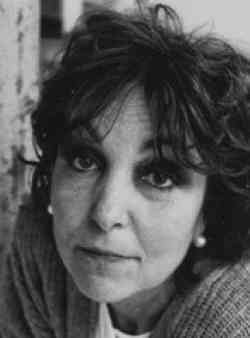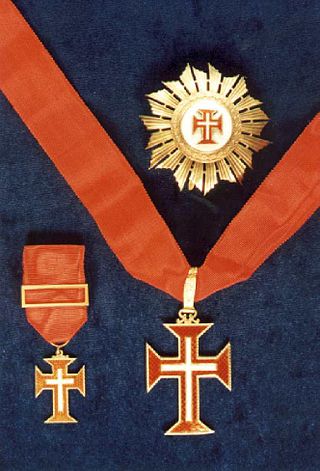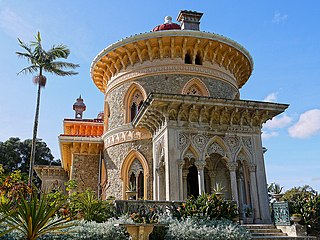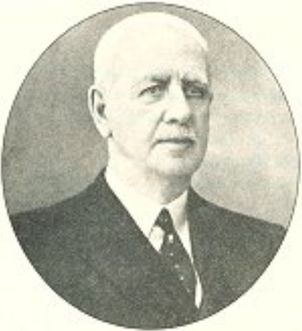
Dame Maria Paula Figueiroa Rego was a Portuguese-British visual artist, widely considered the pre-eminent woman artist of the late 20th and early 21st century, known particularly for her paintings and prints based on storybooks. Rego's style evolved from abstract towards representational, and she favoured pastels over oils for much of her career. Her work often reflects feminism, coloured by folk-themes from her native Portugal.

Cascais is a town and municipality in the Lisbon District of Portugal, located on the Portuguese Riviera. The municipality has a total of 214,158 inhabitants in an area of 97.40 km2. Cascais is an important tourist destination. Its marina hosts events such as the America's Cup and the town of Estoril, part of the Cascais municipality, hosts conferences such as the Horasis Global Meeting.
Filipe Pinto Basto Soares Franco was the 46th president of Sporting CP, one of Portugal's biggest comprehensive sports clubs, second child and second son of Rui Guedes Soares Franco and Isabel Maria da Câmara Ferreira Pinto Basto.

Association football, the most popular sport in Portugal, has a long and storied history in the country, following its introduction in 1875 in cities such as Funchal, Lisbon, Porto and Coimbra by English merchants and Portuguese students arriving back home from studying in England. This led to the establishment of local clubs dedicated to the practice of the sport.
Jorge Torlades O'Neill, was the titular and official head of the Clanaboy O'Neill dynasty, whose family has been in Portugal since the 18th century.
Sports in Portugal are important in Portuguese culture. High-profile, successful competitive athleticism and sportsmanship in Portugal can be traced back to the time of Ancient Rome. Gaius Appuleius Diocles was a noteworthy charioteer born in Lamego who became one of the most celebrated athletes in ancient history. He is often cited as the highest-paid athlete of all time. Football is the most popular sport in Portugal. Other than football, many other professional or semi-professional well organized sport competitions take place every season in Portugal, including basketball, swimming, athletics, tennis, gymnastics, futsal, rink hockey, team handball, volleyball, surfing, canoeing and rugby union championships among the hundreds of sports played in this country.

The Lisbon Regicide or Regicide of 1908 was the assassination of King Carlos I of Portugal and the Algarves and his heir-apparent, Luís Filipe, Prince Royal of Portugal, by assassins sympathetic to Republican interests and aided by elements within the Portuguese Carbonária, disenchanted politicians and anti-monarchists. The events occurred on 1 February 1908 at the Square of Commerce along the banks of the Tagus River in Lisbon, commonly referred to by its antiquated name Terreiro do Paço.

Club Internacional de Foot-ball is a sports club founded in 1902, from Lisbon, Portugal.
The Oporto Cricket and Lawn Tennis Club is a multi-sports and social club located on Campo Alegre in Porto, Portugal. It was founded in 1855 by the British people working in Porto. Initially founded as Oporto Cricket Club, it is the oldest cricket club in mainland Europe. In 1877 they built three tennis courts and the name of the club was changed to its current form. In 1923 the present grounds were acquired.

The Ordem Militar de Cristo, the full name of which is the Military Order of Our Knights of Lord Jesus Christ, is a Portuguese honorific Order which takes its name from the extinct Order of Christ (1834), which is given for distinguished service in the performance of functions in sovereign positions or public administration, and for the judiciary and diplomacy, which is seen as being particularly distinguished.

The Portuguese Riviera is a term used in the tourist industry for the affluent coastal region to the west of Lisbon, Portugal, centered on the coastal municipalities of Cascais, Oeiras and Sintra. It is coterminous with the Estoril Coast and occasionally known as the Costa do Sol. Portuguese themselves do not use this expression.

The Casa das Histórias Paula Rego is a museum in Cascais, Lisbon District, on the Portuguese Riviera, designed by the architect Eduardo Souto de Moura to house some of the works of the artist Paula Rego.

Guilherme Ferreira Pinto Basto was a Portuguese all-round sportsman and entrepreneur. He is considered to have been the pioneer of both football and tennis in Portugal, playing in the first recorded football match and winning the national tennis championships on nine occasions.
Events in the year 2022 in Portugal.
Foot-Ball Club Lisbonense, better known as Club Lisbonense, was a football team based in Lisbon, Portugal, which existed between 1892 and 1902. Lisbonense played a crucial role in the amateur beginnings of football in Portugal, being the very first football club in the capital, winning the first football ‘cup’ in the country on 2 March 1894 and then being at the roots of the foundation of the Club Internacional de Foot-ball. Their equipment was blue.
Eduardo Pinto Basto was a Portuguese football pioneer who is regarded as one of the most important figures in the amateur beginnings of football in Portugal. He had a pivotal and prominent role in promoting this sport in Portugal and particularly in Lisbon when he ordered a series of footballs from England, which he distributed to various military units, thus giving a huge boost to the practice of this sport. Together with his brothers Guilherme and Frederico, he was the fundamental head behind the foundations of some of the earliest clubs in the city such as Club Lisbonense (1892) and Club Internacional de Foot-ball (1902), serving both teams as a forward. The dates of his birth and death are unknown.

António Nicolau de Almeida was a Portuguese football executive, who founded FC Porto on 28 September 1893 and then served as its first president until 1896, when he gave up from the club at the request of his wife.
The Taça D. Carlos I was a friendly football tournament that was held only once, in Campo Alegre, Porto, on 2 March 1894. That match was contested by representative teams of Lisbon and Porto, and ended in a 1–0 win to the Lisbonenses, but most important than the result was its historical significance, as it was the first major football event in Portugal as well as the first football ‘cup’ played on the Iberian Peninsula. Moreover, the Taça D. Carlos I was the first domestic match between those two cities.

The first football match in mainland Portugal took place in Campo Pequeno, Lisboa on 22 January 1889. Three months earlier, in October 1888, a test match had already been held in Cascais contested between members of the Sporting Club of Cascais, one of the first clubs dedicated to football in Portugal. However, the one held in January was the first proper match in Portuguese football history, since the pitch had markings and goalposts, and the match followed the rules and lasted 90 minutes. It was also more competitive because the match was contested between Portuguese noblemen and a group of English workers living in Portugal, and thus it can be considered as one of the first ‘international’ matches in the history of the sport. Furthermore, the one held in January was a public event, and Lisbon's high society turned out in force to see what the game was like. Both games were held at the initiative of Guilherme Pinto Basto, one of the members of Cascais club.
Frederico Tomás Ferreira Pinto Basto was a Portuguese football pioneer who is regarded as one of the most important figures in the amateur beginnings of football in Portugal. He is best known for playing in the first football match in mainland Portugal in Cascais in October 1888, and for then playing for a Portuguese team on 22 January 1889, against a team made-up British in Lisbon. Together with his brothers Guilherme and Eduardo, he was the fundamental head behind the foundations of some of the earliest clubs in the city such as Club Lisbonense (1892) and Club Internacional de Foot-ball (1902), serving both teams as a forward. He was also the owner of Casa das Gaeiras.













